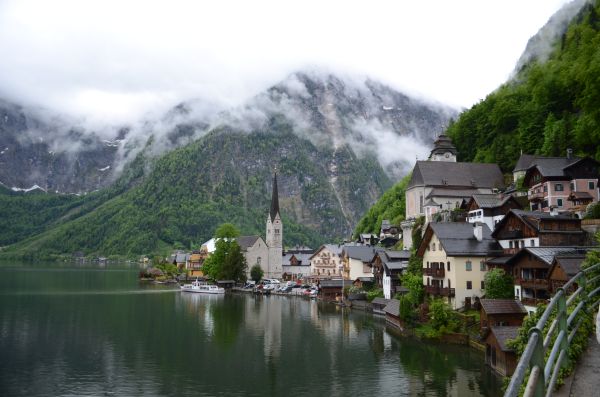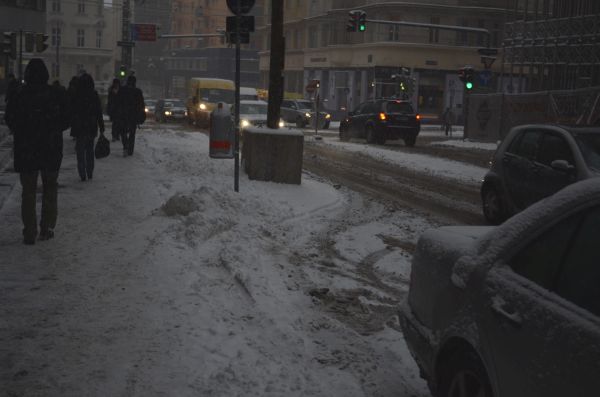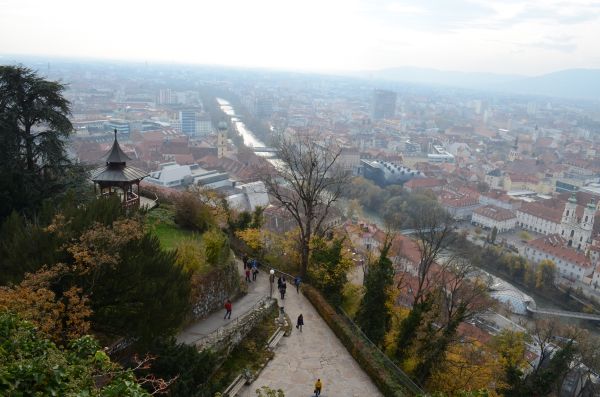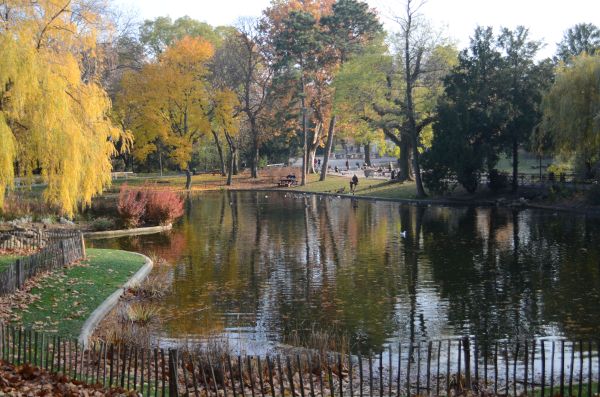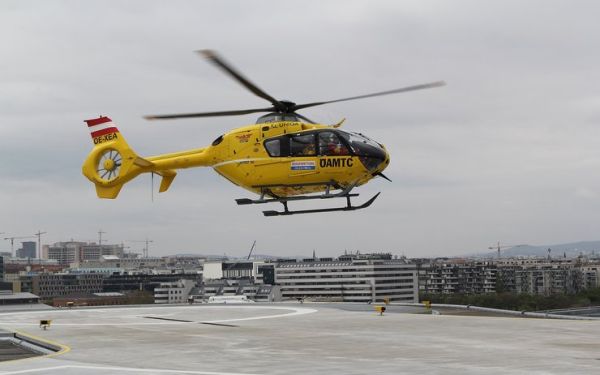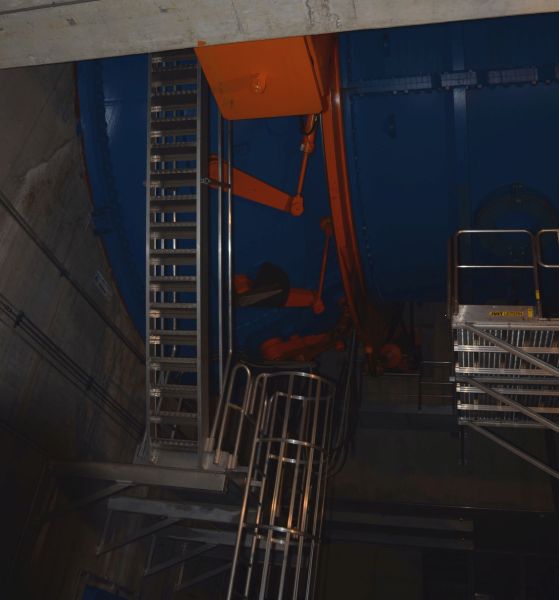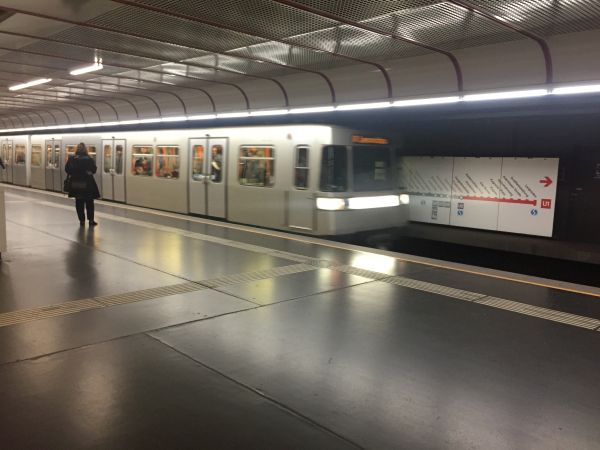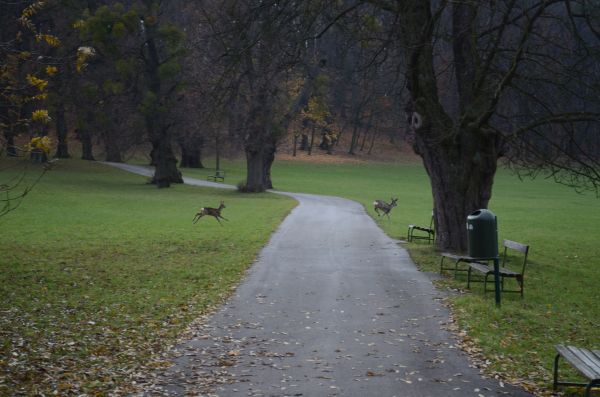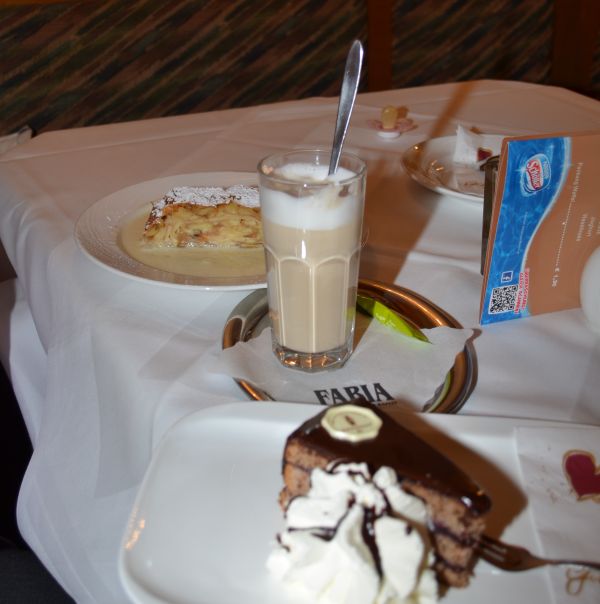Moving to Austrian socialism
On Habré they often write about emigration to different countries, but there wasn’t about Austria yet. It's time to fill the gap.
Hallstatt
I will try to describe my experience of moving to Austria (to Vienna), as well as talk a little about the features of the country, which I learned during the 6 years of my stay here. I tried briefly, I apologize in advance for not working :)
In 2012, my wife and I decided that it would be good to try to work abroad. My wife really wanted to go to a German-speaking country, I went to Britain, so I was looking for parallel in London and Switzerland (I did not consider Germany for historical reasons). Suddenly, a London recruiter called and offered to try an Austrian bookmaker.
Interview
After a short chat on Skype, we were both invited to Vienna for a personal interview. At that time we did not know anything about Austria and were there once - 10 kilometers in transit from Germany to Switzerland.
A retreat to the topic of articles about interviews on Habré - after the first interview we were refused, after a couple of weeks I decided to ask the manager the reason and received the answer "I don’t remember, but let's try with another technical person", we had a Skype call a week later and I got an offer.
Salary offered low (about this below), so that, compared with the two programmer salaries in Kiev, we lost a lot. After painful thoughts, we decided not to regret.
I was very lucky to find a company with the experience of transportation from Eastern Europe, I only then realized how important it is.
Sometimes it snows in Austria. Then I got too optimistic, so let's start with dullness
Visa
Everybody knows about Blue-card, and in Austria there are too high wage requirements for it. Because the standard version for Austria: Rot-Weiss-Rot-Karte (colors of the flag of Austria). There are 3 options:
- specially qualified specialists can get a semi-annual visa for a job search and then receive an RWR when they find a job.
- regular employees with a contract, checking the local labor market.
- employees from the list of scarce professions, with a contract and without checking the labor market.
For all groups, you need to score points , for a young university graduate with experience and knowledge of English there are enough points.
In IT, the first group is a waste of time, the third or suitable or not, the majority goes to the second.
RWR card is issued for 2 years with reference to the employer, then an extension for 3 years without binding (called RWR-Plus, if you want to change the job, you want to open the company), then you can apply for Daueraufenthalt (long-term residence permit, renew every 5 years) . Acts as Aufenthaltstitel (Residence Permit), entitles you to freely travel around Schengen. The wife / husband is issued simultaneously with the main applicant, with reference to him (which can then be removed) and immediately RWR-Plus. Citizenship can be obtained after 6 years, from the native must be abandoned.
Documents filed in Kiev, with an apostille, translation and certification. It makes sense to immediately make 2 copies, in Austria, more than once needed. The review period is theoretically 8 weeks. In practice, civil service agencies in Austria often do not invest on time, but they can be kicked (and absolutely necessary) only after the expiration date. Specifically with visas, the process is delayed up to 6-8 months, and here a sensible employer is very helpful, who can kick the magistrate on all channels in his "native Austrian". My push for less than two and a half months. Then you need to get an entry visa (this is necessary - even if you have the right to enter Austria), come, apply for a card, get an RWR in a week and go to work. Before getting a card to the office, they didn’t let me go.
A separate story is the search for housing . To obtain a visa, you must have a contract for housing, you have to look for it remotely (that is, agree on bad and expensive options), and pay for all the time for consideration - that is, huge expenses. The employer helped a lot. He registered the provision of housing for the first month in the contract and convinced the magistrate that this was enough.
Moving
The company organized a flight, rented an apartment for me for a month, partially paid for the purchase of furniture, flexibly and pleasantly arranged (for example, I had to go back for the car, took a return ticket).
The first time he lived in a rented furnished apartment, for the first 2 weeks he found accommodation and moved just at the end of the first month.
I arrived on Friday, and as you remember, I had no right to go to work. Therefore, I settled down and registered (it must be done within three days). Registration is called Meldezettel ( actually Meldebestätigung, but everyone calls it that ) and is needed everywhere. Then I went to the magistrate for a work visa, but he worked until 12:00 and I was late. The first lesson from Austria - you are waiting everywhere with joy, but only during limited hours of work . The second lesson was that the shops closed at 6:00 pm on Saturday and opened on Monday morning. Since the first days I was greedy, I had to be angry and hungry. By evening, I found a Turkish shop and it became easier. After a couple of months, I found out that there is a supermarket open at the weekend: one for all of Vienna. And there is still at the airport.
By law, we had 1 month to re-register a car and six months to exchange rights (with a practical exam). And with that and with others in terms, we did not invest, and this fascinating quest allowed us to get acquainted with the Austrian approach to the laws.
Laws and Customs
Ordnung muss sein ("there must be order") and laws are executed literally - like in Germany. In Austria, it is almost like that, but if it creates discomfort, then we will drop the formalities :) You can always agree - and no bribery, you just need to convince that it will be better. People are ready to go forward and do as convenient. People trust each other. Customs believes the words of the hryvnia against the euro. Instead of a certificate of loans, you can simply say "honestly, there are no loans." The policeman will believe that we really have already begun to re-register the car (I did not check it, but the police promised).
Parking on the sidewalks is impossible, and indeed in the wrong places do not park. But if you need to unload, and the machine does not bother anyone, then you can. But fines are issued to everyone, and Bentley too.
Austrians love order. Termin is necessary for any meeting (appointment, exact time and place). And if you can still privately invite someone right now (but do not expect this in return, they are more accustomed to be invited to visit after 3 weeks), then for the rest, there is no longer a term, and usually they are not in a hurry.
The state religion is Catholicism here (Catholics pay church tax). However, this does not limit other faiths. Historically, there are many Catholic schools and kindergartens, sometimes nuns teach there, but again Muslims can go there if they want. The new government is struggling with "radical Islam", banned the veil, and as always in Austria the next day they remembered that there are clowns, skiers and motorcyclists. I have already told the story about nuclear power plants - something like this happens with the laws very often.
Austrians love mail, and there is a reason. Mail works quickly, reliably and with the times. In the mail come bills, fines, notices, parcels, a bank card with a pin code, and in general everything that should be guaranteed to go.
Before socialism, there was a monarchy in Austria. Austrians yearn for monarchs and love to watch weddings in the UK
Here is socialism : high unemployment benefits, for children, free education, medicine (about this below), museums and other cheap leisure activities are sponsored by the state.
In serious contracts, everything is straightforward and obvious, without small fonts. Because otherwise the court may cancel.
Virtually all organizations (except, of course, the police, the army, and the like) are private companies, but strategic companies are fully regulated by law. For example, insurance is all private and can make their own decisions ... well, let's say for advertising. Who, at what rates and under what conditions to insure - prescribed by law.
Payment for socialism - high taxes and relatively low wages.
Housing
Graz
So, the first week after the move, I was looking for a place to live. Expensive as elsewhere in Europe, and more expensive. The market works, so if they don’t want to turn in a foreigner, they just have to pay more. There are those who do not want to take foreigners. If those who prefer foreigners on the contrary. There are brokers who take 3 monthly rentals ( Provision ) and are more harmful for a tenant rather than useless (Therefore, look for Provisionfrei). Upon arrival, you must pay 3 monthly rent of the deposit ( Kaution ). These amounts are spelled out by law, Kaution lies on the account and is returned together as a percentage. It is impossible to evict before the end of the contract, and in general the law is completely on the side of the renter. Because the contract for an apartment can be on one page, all that is more will be either a repetition of the law, or not work.
After the arrival we rented 37 sq.m. for 750 euros - but it's in an expensive area. You can find 70 meters for 1000, and then further amendments to the areas. The kitchen is also considered to be a room, it is popular to unite them in new houses (this is really convenient). Apartments are often unfurnished.
Houses are divided into Altbau ( old, before the war ) and Neubau ( after the war ), so you need to be careful looking at the ads. Altbau is good because there is limited rental, and they are also beautiful. But there will be a small elevator (and thanks if there is), there are steps everywhere, expensive heating, it’s still cold in winter and hot in summer. Therefore, I prefer only the houses of the 21st century.
Türkenschanzpark, apartments are expensive around it, but maybe it's worth it
Garbage removal and cleaning of the territory is usually included in the rent, but water, electricity, gas and heating are usually not (although there are options). Electricity and gas - there is a default provider and a free market, you can choose cheaper and greener (well, or "bluer", we have 100% hydroelectric station). Heating and water heating in old houses often on gas with a column inside the apartment. I do not recommend: expensive, inefficient, loud. In the new "central heating and heating", it is usually a boiler in the basement of the house - this is the perfect option. As I wrote above, it is important to take into account the communal flat in choosing an apartment, otherwise savings can be sideways.
In a couple of years, you can find cheaper options, for example, Genossenschaft (something like a housing stock) will be significantly cheaper. Or buy your own using available loans. True, a non-Austrian needs permission, but one is always possible for oneself.
By law, the developer is obliged to provide parking spaces, because in new homes there is usually an underground garage. In old parking may be more difficult.
Mobile communication at least 5 euros in advance (I paid 10, but I see advertising) and 20 under the contract. Internet from 25. Here it is necessary to take into account that there is an annual license fee, which increases the cost of seemingly lower rates. 3G coverage is very good throughout the country - at least on tourist routes and ski resorts, communication has always been.
Banks
Standard banks are paid. As a rule, there is a fixed annual fee (I have 40 euros per year), as well as an additional fee. cards, credit cards ... but payments without fees. Free online banks are very popular, but as a visitor I really wanted an Erstebank account to talk with real people.
In standard banks, deposits are unprofitable, and investment accounts have very high commissions, which is why I prefer European online banks. Is that taxes from overseas accounts have to be declared separately. And in the Austrian tax fully monitors accounts, the bank removes taxes and transfers independently.
Lastschriftmandat is very popular - a withdrawal permit under which sellers (for example, electricity) withdraw money themselves. I already wrote - here they trust each other.
And here you will find real paper savings books.
Insurance and taxes
The employer himself makes all deductions, because the employee receives a net to the account. At the end of the year, the employee may file a declaration and receive a tax refund. The largest write-off expenses are expenses for a child (for example, a kindergarten) and interest on loans.
Compulsory insurance includes medical, retirement, cumulative care and accident insurance. With an average salary you will pay 18% insurance and about 20% tax. Scale tax progressive calculator here .
Insurance is compulsory for all, valid and paid from the first day of stay on Aufenthaltstitel, despite the fact that I applied and received the card in a couple of weeks. For a non-working husband / wife you have to pay about 200 euros per month, but for children and a wife if you have children under 18 years old, it is free.
State insurance leaves in predetermined by law insurance. You can additionally take a private insurance.
The medicine
Insurance pays to doctors directly, because for the patient a complete illusion of gratuity. You can go to private doctors and pay from your pocket (the insurance will then return a little), it will often be the same doctors, but they will offer coffee and spend more time on the patient (this is not bad for a foreigner).
There is a Hausarzt (family doctor) who can cure a cold and refer to a specialist if you didn’t know where to go. Doctors have different - some tend to immediately fill with antibiotics, some tend to give the body a handle (and here knowledge of German helps a lot).
There are hospitals for inpatient treatment and emergency care. There are private hospitals that will cure in the same way, but in a five-star hotel. Although the state is also very good for a visitor from Ukraine. In medicine, here is the 21st century - they are able to pull out stones from the kidneys without incisions, repair the heart through the artery and transplant the lungs, completely free of charge for the patient.
If it’s really bad, "suddenly the wizard will arrive in a gelb helicopter and will be shown on TV for free." (gelb = yellow) Photo ÖAMTC.
Many criticize the system of priorities in emergency care - you can wait for hours in the hospital, skipping the "more urgent." At first I didn’t like it either, but last year I was without a queue at the doctor’s office, without waiting for tests, ultrasound tomography, and then going to the ward and preparing for the operation. Since then, I am quietly ready to wait an hour in the queue and be glad that this time I am not the first. And those 4 hours that I once waited, apparently a fair punishment for distracting ambulance doctors by trifles.
The room was excellent, with a comfortable bed, TV, delicious food and excellent doctors. Of course, it is better not to get there, but if suddenly ...
Dentistry is very expensive, many go to Hungary. That is, they will get rid of pain for free, put a seal, and implants cost several thousand, so what can be done on occasion at home.
Security
Austria in general and Vienna in particular are very safe. Partly due to the high minimum standard of living, partly thanks to the strong and expensive police, and also thanks to the neutrality of the country. The most common crime is theft. Traditionally they steal bicycles, they can pull a wallet out of a bag at a train station, there are fraudsters. But in the evening you can walk around the city calmly.
The police can search with a thermal imager from a helicopter and find the kidnapper's handbag.
Austrian police are ready to catch up with the offender.
The army, police, ambulance and firefighters often demonstrate themselves and equipment.
Sport and leisure
Skiing is a national sport (albeit an expensive one). You yourself probably know that Austria has some of the best ski resorts in the world, and you can ski from Vienna on a day off. I will not even apply a photo :)
In Vienna there are several excellent museums, the best in Europe and the oldest zoo in the world, concerts, almost everywhere there are excursions (say, hydroelectric power plants or any plant).
The pipe through which 1/6 of the whole Danube flows. This energy is now powered by my laptop.
In Vienna, there are almost 2 million, the rest of the city is less than 300 thousand. That is, entertainment in other cities will be more boring, and Vienna itself is not the center of world parties.
In many ways, the city and country are fighting tourists and offering discounts to local ones, for which there are annual subscriptions and a lot of discounts. For example, a ticket to the zoo costs 20 euros, the annual subscription is 44.
The city (as well as the whole country) is fully adapted for disabled people and prams. Well, public opinion, too, at concerts no one is surprised wheelchairs, the elderly. It is touching and pleasant for me that everyone can live a full life.
A bunch of bike lanes, so you can ride until they steal a bike. Then get insurance, buy a new one and ride again.
People and Xenophobia
And now the section of generalizations and stereotypes.
On the one hand, people are very tolerant, like migrants. On the other hand, they can be openly rude to blacks and support nationalists. LGBT and other unconventional people are completely comfortable here, and therefore no one is fighting with me for their rights, which is good.
IMHO Austrians are a bit naive and simple-minded. They don’t worry about their career, appearance and other things, do something interesting for them with enthusiasm and raise children in full confidence that social assistance will never end. But at the same time, in any conversation, they will tell you what a terrible collapsing social system they have. The ability to always grumble is a sign of a resident of Vienna.
Vienna is a very multiethnic city, imperial history affects. Most have Hungarian, Czech, Polish roots. A lot of Yugoslavs. As everywhere in Europe there are many Turks, and they love to settle and communicate in their own circle. If you are not tolerant, there are a couple of areas in which it is better not to settle. But their shops work on Sunday. The rest of Austria seems to be much less foreigners.
People believe others, are open and ready to be friends. I know that there is an opposite opinion on this matter, maybe I was just lucky.
There are unwelcoming waiters, or a bit beyond familiarity - some like it, some feel uncomfortable.
Transport and roads
Austrians love cars. The roads are excellent, drive politely and according to the rules, you can drive at your pleasure. As everywhere in Europe.
Between cities it is worth traveling by train. There are ÖBB (Austrian federal roads) that run everywhere, mostly modern and on schedule. But expensive. You can take a card for a year with a discount on everything. There are high-speed trains to neighboring countries.
There are intercity buses, but I don’t see any sense in them. Cheaper, but much less convenient.
Public transportVienna consists of metro, buses and trams. The ticket costs 2.60 and is the same within Vienna for all types of transport (including trains except express trains). Annual subscription of 365 per year and does not go up for 6 years. There are tickets for the day, three, week and month, and tourist along with visits to museums. There are no tricky discounts and plans, because at this price the travel ticket is simply not necessary.
Subway train in the morning rush hour in the center. I apologize for the quality of the photo ...
Sale of tickets in buses was canceled, which is partially offset by the opportunity to buy online (although you did not have to try).
All buses are low-floor, half trams - I think they just love traditional Viennese trams. Metro has elevators at all stations. The city is absolutely adapted for wheelchairs, which is very convenient with a baby carriage.
Vehicles runs mostly on schedule, at large stations there is a scoreboard, on the rest you can watch online. And the tracking is honest, in fact and not according to the schedule.
Bicycles are very popular, even though they are stolen. There are many bike paths in the cities, there are long-distance routes (for example, along the Danube). If it were not for laziness, I would go to work only by bicycle.
Tongue
The official language is German, the Austrian version is distinguished by a couple of exceptions and purely Austrian words. The pronunciation is influenced by local dialects a bit softer, similar to Bavarian. There are many regional dialects, I will note two:
- Vorarlbergerisch - it is spoken in the westernmost federal state of Vorarlberg and is not understood by the rest of the Austrian population.
- Wienerish - Viennese. This is not only a dialect, but also a "cultural phenomenon" that has formed in the capital of a large empire. It sounds beautiful to me.
The language is good because it is logical and basically obeys the rules. And the bad news is that it has cases, gender and a lot of rules. That is, learning is more difficult than English, and it is desirable that you like it.
And it is necessary to learn. I managed to take only 3 lessons before the move, and at first it was depressing. The better I say, the more interesting it is to live.
Ecology
If I find a photo with boars, I will insert it. For the time being let them be roes.
Austrians love and protect their nature. Vienna receives water from alpine high mountain sources (in fact, some are already from artesian wells). Because the standard drink in restaurants is Leitungswasser - tap water. The reservoirs of Austria are among the cleanest in Europe. The lakes in the mountains are cold, but swimming in clear drinking glacier water is great.
Of course, the magnificent forests, in which many animals. The forest area is growing by 40 sq. Km. in year. Wonderful mountains where you can go hiking. But if you like completely wild untouched nature, then there is too much civilization.
Children
In Austria, love children. Kindergartens in Vienna for a certain amount pays the city. Thus, there are "free" public and low-cost private ones, and so are schools. Approximately 200 euros per month will cost a good kindergarten or school - but you can find it for 2500. Universities are all free, good, though not Oxford. There is no cult of need for higher education, many people go to work. At the same time there is respect for academic degrees, the doctor will always and everywhere write "Dr" and the rest will respect him.
In the public garden and school priority with two working parents, and how to find work while there is no kindergarten? Because visitors mostly have to rely on private.
If you want to see something interesting, for example, sit in the fire truck, everything is simple - take your son and ask him to give it a look.
Food
The food is comfortable for the Ukrainian stomach - here they love meat, potatoes are popular (although it is less tasty than Ukrainian). Sausages with french fries (Wurst mit Pommes) are very popular, they can be bought at kiosks (Würstelstand). Sausages with "pommes" wherever something is offered to have a quick snack (for example at a concert or in the mountains).
Products in stores are good, naturally more expensive than in Kiev. Dairy products of excellent quality. The Austrians are very fond of Bio, which will be of the same taste, but more expensive. And Bauern- (farmer) is also popular, so it really is fresher and tastier.
Fish is small and it is expensive, which is not surprising. River fish can be found in restaurants, we buy sea food at Metro and prepare it.
And of course coffee, cake and strudel
The first coffee house in Vienna was opened by a Ukrainian (data diverge - perhaps he was an Armenian or a Pole) with a trophy coffee after protecting Vienna from the Turks. And in some ratings now Ukrainian Fensterkafe is in the lead. Coffee is brewed everywhere and this is a tradition; any meeting usually takes place over a cup of Melange or Latte.
Jobs and earnings
This is socialism, remember? There are trade unions and "collective bargaining agreements" with a minimum wage in the industry (for IT it’s irrelevant, but there is). Mandatory control of time, 25 days of vacation, paid sick leave, 2 months before and 2 years after birth to take care of the child (which can be divided between parents) with full preservation of the workplace, and the court is always on the side of the worker.
The salary is paid 14 times a year: the 13th in the summer and the 14th by Christmas. This is purely a tradition, because taxes and insurance are considered on the annual amount. It disciplines a little to invest in a monthly salary and get money for a vacation.
Salarieslow (well, that's the fee for what is written above). For example, Senior C # Developer can expect about 50k gross after a move. At one interview I was offered 35k. It looks a little, and it is, otherwise why would you need a visitor here? With knowledge of the language in a local company, then you can find a little more, according to statistics, the maximum for programmers is 70k gross per year.
Firms here are mostly grocery. The most developed IT-directions of Vienna are Urban-tech and Biotech. There is also a heavy industry in Austria (they also need programmers), automotive, Siemens and Bombardier factories.
Results
Austria is a country for those who want a quiet, quiet and comfortable life. Vienna often tops the ranking of the best cities to live in, the rest of the cities are not far behind in comfort - only boring. This is not worth going to those who love the sea, a lot of money, career growth and the center of civilization.
I tried, but a bunch of errors and typos probably crept into a text of this size. I ask you to add in the comments and point out errors in PM, I will try to promptly edit.

